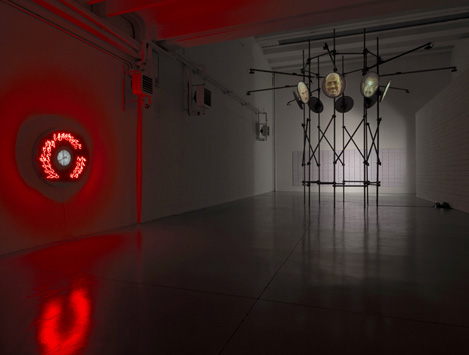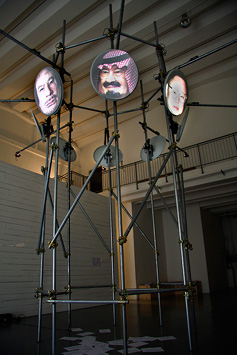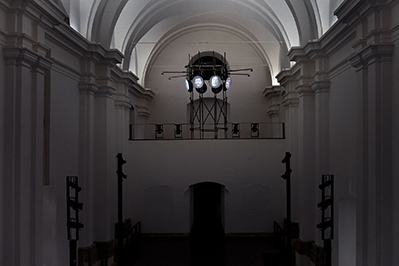[cataloghi][interviste][bibliografia][vita][archivio video][progetti non realizzati - opere pubbliche][archivio edizioni][opere su carta][contatto][Home]
 |
 |
 |
 |
 |
|
|
         |
 |
Installazione
video a otto canali.
Materiali:
Tubi di acciaio, giunti, lettori video, proiettori video, amplificatori, altoparlanti,
parabole satellitari.
Misure: 600
x 760 x 760 cm.
Otto parabole satellitari
montate sugli angoli superiori di un traliccio alto 6 metri di forma ottagonale,
fungono da superficie di proiezione per otto proiettori video tra loro sincronizzati.
Le proiezioni mostrano, in una prima successione, 8 facce animate di personaggi
legati fortemente al potere (inteso come governance). Questi citano, in inglese,
uno dopo l'altro, senza sovrapporsi, 24 aforismi (vedi sotto) estrapolati dal
"principe" di Machiavelli. In una seconda successione compaiono altri
otto, (ripetendo la stessa dinamica drammaturgica della prima successione) e
così anche nella terza. In tutto sono 24 personaggi , di cui due eletti
"democraticamente". La quarta successione, quella finale, mostra contemporaneamente,
su tutte le parabole, immagini drammatiche della primavera araba riprese perlopiù
con telefonini dai dimostranti stessi. Tutto il materiale proviene da internet.
L'ultima sequenza video finisce con l'immagine della morte di Gheddafi.
|
Names of portrayed characters:
|
"The Prince" by Nicolò Machiavelli - Translated by W. K. Marriott
1) The wish to acquire is in truth very natural and common, and men always do so when they can, and for this they will be praised not blamed; but when they cannot do so, yet wish to do so by any means, then there is folly and blame. ( Cap. V) 2) And he who becomes master of a city accustomed to freedom and does not destroy it, may expect to be destroyed by it, for in rebellion it has always the watch-word of liberty and its ancient privileges as a rallying point, which neither time nor benefits will ever cause it to forge (Cap. VI) 3) Hence it is that all armed prophets have conquered, and the unarmed ones have been destroyed. Besides the reasons mentioned, the nature of the people is variable, and whilst it is easy to persuade them, it is difficult to fix them in that persuasion. And thus it is necessary to take such measures that, when they believe no longer, it may be possible to make them believe by force. (Cap. IX) 4) It is to be added also that a prince can never secure himself against a hostile people, because of their being too many, whilst from the nobles he can secure himself, as they are few in number. (Cap. XII) The chief foundations of all states, new as well as old or composite, are good laws and good arms
(Cap. XVI) 6) There is nothing wastes so rapidly as liberality, for even whilst you exercise it you lose the power to do so, and so become either poor or despised, or else, in avoiding poverty, rapacious and hated. And a prince should guard himself, above all things, against being despised and hated; and liberality leads you to both. Therefore it is wiser to have a reputation for meanness which brings reproach without hatred, than to be compelled through seeking a reputation for liberality to incur a name for rapacity which begets reproach with hatred.
7) This is to be asserted in general of men, that they are ungrateful, fickle, false, cowardly, covetous, and as long as you succeed they are yours entirely; they will offer you their blood, property, life and children, as is said above, when the need is far distant; but when it approaches they turn against you.
8) Men more quickly forget the death of their father than the loss of their patrimony.
9) Every one admits how praiseworthy it is in a prince to keep faith, and to live with integrity and not with craft. Nevertheless our experience has been that those princes who have done great things have held good faith of little account, and have known how to circumvent the intellect of men by craft, and in the end have overcome those who have relied on their word. (Cap. XVIII) 10) But it is necessary to know well how to disguise this characteristic, and to be a great pretender and dissembler; and men are so simple, and so subject to present necessities, that he who seeks to deceive will always find someone who will allow himself to be deceived.
12) And when neither their property nor honour is touched, the majority of men live content, and he has only to contend with the ambition of a few, whom he can curb with ease in many ways.
13) And here it should be noted that hatred is acquired as much by good works as by bad ones, therefore, as I said before, a prince wishing to keep his state is very often forced to do evil; for when that body is corrupt whom you think you have need of to maintain yourself - it may be either the people or the soldiers or the nobles - you have to submit to its humours and to gratify them, and then good works will do you harm. (Cap. XX) 14) The best possible fortress is - not to be hated by the people, because, although you may hold the fortresses, yet they will not save you if the people hate you, for there will never be wanting foreigners to assist a people who have taken arms against you.
Nothing makes a prince so much esteemed as great enterprises and setting a fine example. (Cap. XXI)
17) And the first opinion which one forms of a prince, and of his understanding, is by observing the men he has around him. (Cap. XXII) 18) There are three classes of intellects: one which comprehends by itself; another which appreciates what others comprehend; and a third which neither comprehends by itself nor by the showing of others; the first is the most excellent, the second is good, the third is useless. (Cap. XXIII) 19) There is no other way of guarding oneself from flatterers except letting men understand that to tell you the truth does not offend you.
20) Therefore it
must be inferred that good counsels, whencesoever they come, are born
of the wisdom of the prince, and not the wisdom of the prince from good
counsels. (Cap. XXV) 21) Nevertheless, not to extinguish our free will, I hold it to be true that Fortune is the arbiter of one-half of our actions, but that she still leaves us to direct the other half, or perhaps a little less.
22) Fortune being changeful and mankind steadfast in their ways, so long as the two are in agreement men are successful, but unsuccessful when they fall out.
23) one has to remark
that men ought either to be well treated or crushed, because they can
avenge themselves of lighter injuries, of more serious ones they cannot; (Cap)III) 24) a general rule
is drawn which never or rarely fails: that he who is the cause of another
becoming powerful is ruined; because that predominancy has been brought
about either by astuteness or else by force, and both are distrusted by
him who has been raised to power. |